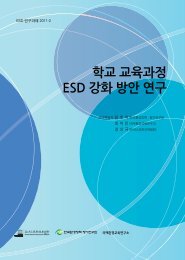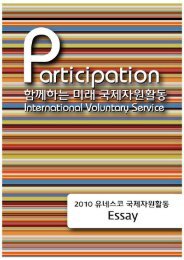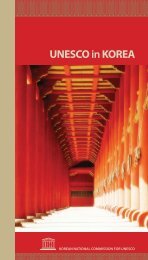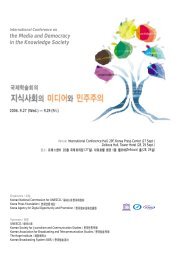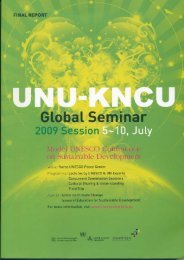- Page 1:
01 교육, 과학 및 문화적 성
- Page 4 and 5:
(가) 음화의 형태로 노출,
- Page 6 and 7:
제6조 각 당사국은 자국 내
- Page 8 and 9:
2. 본 협정을 수락함에 있
- Page 11 and 12:
Agreement For Facilitating the Inte
- Page 13 and 14:
Article IV 1. To obtain the exempti
- Page 15 and 16:
etween States which are both partie
- Page 17 and 18:
provided for in Article XIII declar
- Page 19:
02 교육, 과학 및 문화적 자
- Page 22 and 23:
나. 본 협정 부속서 B, C, D,
- Page 24 and 25:
제 7 조 체약국은 분쟁 해
- Page 26 and 27:
제 17 조 부속서 A, B, C, D,
- Page 28 and 29:
(부속서 A에 언급된 예외사
- Page 30 and 31:
부속서 E 맹인들을 위한 물
- Page 33 and 34:
Agreement on the Importation of Edu
- Page 35 and 36:
(ii) Other articles specially desig
- Page 37 and 38:
3. The instruments of ratification
- Page 39 and 40:
Annexes Annex A Books, publications
- Page 41 and 42:
(v) Collections and collectors' pie
- Page 43:
hereunder. 2. In the event of the U
- Page 47 and 48:
세계저작권협약 (제 17조항
- Page 49 and 50:
기간보다 짧아서는 아니된
- Page 51 and 52:
제 8 조 1. 1952년 9월 26일부
- Page 53 and 54:
제 16 조 1. 이 협약은 불어,
- Page 55 and 56:
제 17조에 관한 부속선언
- Page 57 and 58:
Universal Copyright Convention, wit
- Page 59 and 60:
espect of the second or any subsequ
- Page 61 and 62:
efore the expiration of a period of
- Page 63 and 64:
Educational, Scientific and Cultura
- Page 65 and 66:
arrangements that are or may be in
- Page 67:
3. The Committee shall elect its Ch
- Page 71 and 72:
무력충돌시 문화재 보호를
- Page 73 and 74:
제 5조. 점령 1. 협약 체약
- Page 75 and 76:
이 지속되는 동안 당사국
- Page 77 and 78:
다. 이 협약의 시행규칙이
- Page 79 and 80:
요청할 수 있다. 문화재 보
- Page 81 and 82:
2. 이 협약은 비준서나 가
- Page 83 and 84:
성한다면 제38조에 따라 국
- Page 85 and 86:
자는 그의 임명에 대하여
- Page 87 and 88:
관소를 특별보호 문화재로
- Page 89 and 90:
2. 이의가 제기된 경우, 제1
- Page 91:
IV. 특수표지 제 20조. 특수
- Page 94 and 95:
irrespective of origin or ownership
- Page 96 and 97:
egulations or instructions such pro
- Page 98 and 99:
division in size or larger. Wheneve
- Page 100 and 101:
(a) immovable cultural property und
- Page 102 and 103:
Article 22. Conciliation procedure
- Page 104 and 105:
The High Contracting Parties undert
- Page 106 and 107:
which are Parties to the present Co
- Page 108 and 109:
Director-General of the United Nati
- Page 110 and 111:
Article 4. Appointment of 'Commissi
- Page 112 and 113:
and experts shall be met by the Par
- Page 114 and 115:
4. The Director-General, or the Hig
- Page 116 and 117:
2. The Director-General shall send
- Page 118 and 119:
(b) at the entrance to other immova
- Page 121 and 122:
고고학적 발굴에 적용되는
- Page 123 and 124:
Ⅱ. 일반기준 고고학적 유
- Page 125 and 126:
Ⅲ. 발굴규제 및 국제협력
- Page 127 and 128:
24.(가) 면허를 내어준 나라
- Page 129 and 130:
Recommendation on International Pri
- Page 131 and 132:
(a) In the former case, the criteri
- Page 133 and 134:
10. In as much as archaeology is a
- Page 135 and 136:
of objects and monuments uncovered.
- Page 137 and 138:
IV. Trade in antiquities 27. In the
- Page 139:
06 출판물의 국제적 교환에
- Page 142 and 143:
2. 본 협약은 1958년 12월 3일
- Page 144 and 145:
제 12조. 양자 협약 체약국
- Page 147 and 148:
Convention concerning the Internati
- Page 149 and 150:
enumerated in paragraph 1 of the pr
- Page 151 and 152:
espective constitutional procedures
- Page 153:
07 국가간 공식 출판물 및
- Page 156 and 157:
서류, 중앙, 연방 및 지역
- Page 158 and 159:
제 13조. 기존 협약과의 관
- Page 161 and 162:
Convention concerning the Exchange
- Page 163 and 164:
agreed between the exchange authori
- Page 165 and 166:
Article 16. Accession 1. The presen
- Page 167:
08 박물관을 만인에게 이용
- Page 170 and 171:
1960년 12월 4일에 본 권고를
- Page 172 and 173:
(나) 박물관은 상기 여행사
- Page 175 and 176:
Recommendation concerning the Most
- Page 177 and 178:
III. Material arrangements in and a
- Page 179:
appropriate bodies responsible for
- Page 183 and 184:
고적 및 명승지의 미관 및
- Page 185 and 186:
6. 경관지의 보호를 위해
- Page 187 and 188:
회화적 특성의 보호를 위
- Page 189 and 190:
33. 자문기관은 전국적, 지
- Page 191 and 192:
Recommendation concerning the Safeg
- Page 193 and 194:
4. In choosing the measures to be a
- Page 195 and 196:
(e) Creation and maintenance of nat
- Page 197 and 198:
eserves, strict or special. Such na
- Page 199:
The foregoing is the authentic text
- Page 203 and 204:
문화재의 불법적인 반출입
- Page 205 and 206:
III. 제안 조치 문화재의 승
- Page 207:
반환 및 환수되어야 하는
- Page 210 and 211:
The General Conference recommends t
- Page 212 and 213:
(b) The functions of the national s
- Page 214 and 215:
heritage of mankind, each Member St
- Page 217 and 218:
국제문화협력의 원칙 선언
- Page 219 and 220:
제 5조 문화협력은 지식과
- Page 221 and 222:
Declaration of Principles of Intern
- Page 223 and 224:
3. To contribute to the application
- Page 225:
12 공공 및 사적 작업에 의
- Page 228 and 229:
따라서 문화유산의 보존과
- Page 230 and 231:
7. 문화재의 보존 또는 구
- Page 232 and 233:
(가) 문화재의 보호에 책임
- Page 234 and 235:
에 있어서 결정에 앞서 당
- Page 236 and 237:
은 지방당국 또는 중요한
- Page 239 and 240:
Recommendation concerning the Prese
- Page 241 and 242:
I. Definition 1. For the purpose of
- Page 243 and 244:
historical associations and continu
- Page 245 and 246:
structures, including structures fo
- Page 247 and 248:
which might endanger cultural prope
- Page 249:
(a) Ex gratia payments to individua
- Page 253 and 254:
문화재의 불법적인 반출입
- Page 255 and 256:
(차) 녹음, 사진, 영화로 된
- Page 257 and 258:
제 7 조 본 협약의 당사국
- Page 259 and 260:
(라) 본 협약의 각 당사국
- Page 261 and 262:
제 22 조 본 협약의 당사국
- Page 263 and 264:
Convention on the Means of Prohibit
- Page 265 and 266:
(g) property of artistic interest,
- Page 267 and 268:
(museums, libraries, archives, labo
- Page 269 and 270:
Article 10 The States Parties to th
- Page 271 and 272:
(b) consultation and expert advice;
- Page 273:
Organization which are referred to
- Page 277 and 278:
1971년 7월 24일 파리에서 개
- Page 279 and 280:
제 4 조 1. 저작물의 보호기
- Page 281 and 282:
국적을 가진 국가의 외교
- Page 283 and 284:
의 기간이 경과할 때까지
- Page 285 and 286:
다. 가. 호 및 나. 호의 규
- Page 287 and 288:
나. 각 체약국은 다음 사항
- Page 289 and 290:
제 11 조 1. 다음의 임무를
- Page 291 and 292:
제 18 조 이 협약은 둘 이상
- Page 293 and 294:
라 즉각 구성된 것으로 간
- Page 295:
일정 국제기구의 저작물에
- Page 298 and 299:
accords to works of its nationals f
- Page 300 and 301:
unpublished works by the law of the
- Page 302 and 303:
the domestic law in such other Stat
- Page 304 and 305:
send, by registered airmail, copies
- Page 306 and 307:
(ii) the translation is for use onl
- Page 308 and 309:
(e) Licences obtainable after three
- Page 310 and 311:
Article VII This Convention shall n
- Page 312 and 313:
Article XII The Intergovernmental C
- Page 314 and 315:
arrangements before the date this C
- Page 316 and 317:
2. Any States that are not party to
- Page 318 and 319:
Protocol 2 annexed for the Universa
- Page 321 and 322:
음반의 무단복제로부터 음
- Page 323 and 324:
(나) 강제허락에 관한 허가
- Page 325:
2. 폐기는 유엔 사무총장이
- Page 328 and 329:
phonogram and which embodies all or
- Page 330 and 331:
apply this criterion instead of the
- Page 332 and 333:
Dutch, German, Italian and Portugue
- Page 335 and 336:
문화교류와 교육의 확산
- Page 337 and 338:
기반을 두어야 한다. 제 4
- Page 339 and 340:
Declaration of Guiding Principles o
- Page 341 and 342:
oadcasting shall be guided by the p
- Page 343:
2. With respect to commercial adver
- Page 347 and 348:
문화 및 자연유산의 국가
- Page 349 and 350:
의 생식지 및 자생지인 명
- Page 351 and 352:
자문 단체 14. 전문적 기관
- Page 353 and 354:
27. 가입국은 자연 유산의
- Page 355 and 356:
설치하거나 또는 당해 유
- Page 357 and 358:
63. 문화 및 자연 유산에 관
- Page 359 and 360:
Recommendation concerning the Prote
- Page 361 and 362:
sites : topographical areas, the co
- Page 363 and 364:
Specialized public services 13. Wit
- Page 365 and 366:
20. Any work required should be pre
- Page 367 and 368:
authorities and representatives of
- Page 369 and 370:
49. Central and local authorities s
- Page 371:
societies, amenity improvement soci
- Page 375 and 376:
세계문화유산 및 자연유산
- Page 377 and 378:
현저한 보편적 가치를 가
- Page 379 and 380:
표 1인, 국제기념물유적이
- Page 381 and 382:
제 13 조 1. 세계유산위원회
- Page 383 and 384:
4. 기금에 대한 분담금 및
- Page 385 and 386:
제 22 조 세계유산위원회가
- Page 387 and 388:
VIlI. 최종조항 제 30 조 이
- Page 389 and 390:
Convention concerning the Protectio
- Page 391 and 392:
which are of outstanding universal
- Page 393 and 394:
III. Intergovernmental Committee fo
- Page 395 and 396:
so require, under the title of List
- Page 397 and 398:
Director-General of the United Nati
- Page 399 and 400:
ound by the provisions of paragraph
- Page 401 and 402:
(e) low-interest or interest-free l
- Page 403 and 404:
VIII. Final clauses Article 30 This
- Page 405:
whole or in part, then, unless the
- Page 409 and 410:
번역가와 번역 업무의 합
- Page 411 and 412:
II. 번역가의 일반적인 법
- Page 413 and 414:
(마) 번역가 개인 혹은 집
- Page 415:
세계저작권 협약과 문화예
- Page 418 and 419:
Adopts, this twenty-second day of N
- Page 420 and 421:
(d) specify that the authorizations
- Page 422 and 423: (h) promote the establishment and d
- Page 424 and 425: VI. Developing countries 15. The pr
- Page 427 and 428: 역사 유적지의 보호와 현
- Page 429 and 430: Ⅱ. 일반원칙 2. 역사 유적
- Page 431 and 432: 공평하게 수립되는 것을
- Page 433 and 434: 24. 도시계획이나 구조적,
- Page 435 and 436: 39. 일반적으로 이러한 공
- Page 437: (가) 모든 형태의 정보와
- Page 440 and 441: Noting the absence in many cases of
- Page 442 and 443: kinds, particularly that resulting
- Page 444 and 445: establishment of neighborhood or sm
- Page 446 and 447: protected areas and surrounding zon
- Page 448 and 449: of noise, shocks and vibrations cau
- Page 450 and 451: caused by natural disasters. 42. In
- Page 452 and 453: 53. Refresher courses for teachers
- Page 455 and 456: 일반 대중의 문화생활에
- Page 457 and 458: 목표달성을 위해 문화정책
- Page 459 and 460: 2. 본 권고의 목적상: (가)
- Page 461 and 462: (마) 인간들로 하여금 그들
- Page 463 and 464: 6. 회원국들과 당국들은: (
- Page 465 and 466: (1) 모든 전문 예술가들에
- Page 467 and 468: (라) 피드백과 개인적인 동
- Page 469 and 470: 려해야 한다; (라) 문화의
- Page 471: Recommendation on Participation by
- Page 475 and 476: the cultural development of mankind
- Page 477 and 478: the least privileged, in regard to
- Page 479 and 480: experience and expression with a vi
- Page 481 and 482: at large, based upon the people's o
- Page 483 and 484: institutions providing professional
- Page 485 and 486: production centers for use by audie
- Page 487 and 488: appreciation of the values of each
- Page 489: 22 문화재의 국제교류에 관
- Page 492 and 493: 널리 알려진 기원과 논의
- Page 494 and 495: 육성해야 한다. 문화재의
- Page 497 and 498: Recommendation concerning the Inter
- Page 499 and 500: The General Conference recommends t
- Page 501 and 502: 10. Member States, in accordance wi
- Page 503: 23 평화와 국제이해의 강화
- Page 506 and 507: 본 협약에 가입한 국가들
- Page 508 and 509: 자들에 대해 의견을 표명
- Page 510 and 511: 4. 마찬가지로, 권리의 평
- Page 512 and 513: Recalling Article 4 of the Internat
- Page 514 and 515: Article II 1. The exercise of freed
- Page 516 and 517: Article VIII Professional organizat
- Page 519: 24 동산 문화재 보호 권고 R
- Page 522 and 523:
문화 및 자연유산의 국가
- Page 524 and 525:
기에 가장 적합하다고 판
- Page 526 and 527:
(e) 회원국은 특정한 문화
- Page 528 and 529:
(iii) 필요에 따라, 상대습
- Page 530 and 531:
23. 또한 회원국은 박물관
- Page 532 and 533:
cultural property and, at the same
- Page 534 and 535:
(xi) zoological, botanical and geol
- Page 536 and 537:
III. MEASURES RECOMMENDED 11. In ac
- Page 538 and 539:
(b) if appropriate, providing for i
- Page 540 and 541:
(a) provide children, young people
- Page 542 and 543:
IV. INTERNATIONAL CO-OPERATION 25.
- Page 545 and 546:
저작권사용료 이중과세 방
- Page 547 and 548:
(가) 회원국 또는 정치적
- Page 549 and 550:
3. 비준, 승인, 가입에 관한
- Page 551 and 552:
제 17조: 분쟁의 해석 및 해
- Page 553 and 554:
(나) (회원국 나) 에서 (1) [
- Page 555 and 556:
(차) 수익자 거주국가는 본
- Page 557 and 558:
지위의 중개인을 통해 영
- Page 559 and 560:
제 3안 제6조 다: 양 회원국
- Page 561 and 562:
제 2안: 제 7조 가(2) - 누진
- Page 563 and 564:
5. 체약국의 기업체가 부분
- Page 565:
제 14조: 해석 체약국에 의
- Page 568 and 569:
for the use of, or the right to use
- Page 570 and 571:
discrimination based on nationality
- Page 572 and 573:
4. It is understood that, at the ti
- Page 574 and 575:
(a) signature of this Convention, t
- Page 576 and 577:
(i)[income tax applicable] (ii)[oth
- Page 578 and 579:
in force in a State; (f) the term `
- Page 580 and 581:
3. Notwithstanding the provisions o
- Page 582 and 583:
independently of the center of acti
- Page 584 and 585:
3. The provisions of paragraphs 1 a
- Page 586 and 587:
nevertheless take into account the
- Page 588 and 589:
Contracting State to any taxation o
- Page 590 and 591:
(a) to carry out administrative mea
- Page 593:
26 동영상의 보호 및 보존
- Page 596 and 597:
동시에 영상매체의 보존
- Page 598 and 599:
II. 일반 원칙 3. 모든 자국
- Page 600 and 601:
취하며, 또한 영상매체의
- Page 602 and 603:
16. 회원국들은 영상매체를
- Page 605 and 606:
Recommendation for the Safeguarding
- Page 607 and 608:
Desiring to supplement and extend t
- Page 609 and 610:
and may even lead to their total de
- Page 611 and 612:
international conventions and of na
- Page 613 and 614:
(a) establish and make available na
- Page 615:
ecognized archives exclusively for
- Page 619 and 620:
예술가의 지위에 관한 권
- Page 621 and 622:
예술은 교육에 중요한 역
- Page 623 and 624:
2. '지위'라는 용어는 한편
- Page 625 and 626:
관한 규정이 있어야 한다
- Page 627 and 628:
3. 회원국은 필요한 조치를
- Page 629 and 630:
(마) 회원국은 거치료 혹은
- Page 631 and 632:
위해서 해야 한다. 8. 예술
- Page 633 and 634:
요할 경우 다른 사회적 보
- Page 635 and 636:
다. 국제문화협력의 원칙
- Page 637:
(나) 노사관계: 단체협정
- Page 640 and 641:
insurance provisions contained in t
- Page 642 and 643:
Taking into account the diversity o
- Page 644 and 645:
III. Guiding principles 1. Member S
- Page 646 and 647:
(c) take all appropriate measures,
- Page 648 and 649:
Literary and Artistic Works, the Un
- Page 650 and 651:
(e) recognize that profit-sharing s
- Page 652 and 653:
(b) in order to preserve the health
- Page 654 and 655:
through national effort and interna
- Page 656 and 657:
(3) The States Parties to the prese
- Page 658 and 659:
(a) Employment and human resources
- Page 661:
28 전통문화 및 민속보호에
- Page 664 and 665:
총회는 회원국들이 본 권
- Page 666 and 667:
조정기관의 설치; (라) 개
- Page 668 and 669:
(가) 민속에 관한 국제 및
- Page 670 and 671:
give effect within their territorie
- Page 672 and 673:
copies for regional institutions, t
- Page 674 and 675:
the `intellectual property aspects'
- Page 677:
29 유네스코 문화다양성 선
- Page 680 and 681:
유엔체제 중에서 유네스코
- Page 682 and 683:
조건을 마련해 주어야 한
- Page 684 and 685:
12. 매체와 지구적 정보 네
- Page 686 and 687:
Aspiring to greater solidarity on t
- Page 688 and 689:
CULTURAL DIVERSITY AND CREATIVITY A
- Page 690 and 691:
Annex II Main lines of an action pl
- Page 692 and 693:
17. Assisting in the emergence or c
- Page 695 and 696:
수중문화유산 보호에 관한
- Page 697 and 698:
2. (a) “당사국”이란 본
- Page 699 and 700:
제5조 수중문화유산에 부
- Page 701 and 702:
언은 그 수중문화유산과
- Page 703 and 704:
제12조 심해저의 수중문화
- Page 705 and 706:
제18조 수중문화유산의 압
- Page 707 and 708:
제24조 협약 사무국 1. 사무
- Page 709 and 710:
제30조 유보 제29조는 예외
- Page 711 and 712:
부 속 서 수중문화유산을
- Page 713 and 714:
(m) 박물관과 타 연구기관,
- Page 715 and 716:
규칙 25. 유적지 관리계획
- Page 717 and 718:
Convention on the Protection of the
- Page 719 and 720:
(ii) vessels, aircraft, other vehic
- Page 721 and 722:
11. No act or activity undertaken o
- Page 723 and 724:
Article 9 - Reporting and notificat
- Page 725 and 726:
(b) shall issue all necessary autho
- Page 727 and 728:
7. No State Party shall undertake o
- Page 729 and 730:
methodology and technology, and leg
- Page 731 and 732:
e submitted to UNESCO for mediation
- Page 733 and 734:
Article 31 - Amendments 1. A State
- Page 735 and 736:
Annex Rules concerning activities d
- Page 737 and 738:
(h) a conservation programme for ar
- Page 739 and 740:
direction and control of, and in th
- Page 741:
XIV. Dissemination Rule 35. Project
- Page 745 and 746:
무형문화유산 보호를 위한
- Page 747 and 748:
문화적 다양성과 인류의
- Page 749 and 750:
제 7 조 - 위원회의 임무 이
- Page 751 and 752:
을 위하여 노력한다. 가.
- Page 753 and 754:
적으로 선정하고 증진한다
- Page 755 and 756:
에서 분담한다. 3. 수혜당
- Page 757 and 758:
VII. 보 고 서 제 29 조 - 당
- Page 759 and 760:
제 38 조 - 개 정 1. 당사국
- Page 761 and 762:
Convention for the Safeguarding of
- Page 763 and 764:
(c) to raise awareness at the local
- Page 765 and 766:
Article 5 - Intergovernmental Commi
- Page 767 and 768:
4. The Committee may invite to its
- Page 769 and 770:
(a) ensure recognition of, respect
- Page 771 and 772:
exchange of information and experie
- Page 773 and 774:
3. The beneficiary State Party shal
- Page 775 and 776:
shall not be eligible as a Member o
- Page 777 and 778:
other State Party three months afte
- Page 779:
Article 39 - Authoritative texts Th
- Page 783 and 784:
문화유산의 고의적 파괴에
- Page 785 and 786:
제 4조 : 평화 시 행해지는
- Page 787 and 788:
UNESCO Declaration concerning the I
- Page 789 and 790:
international cultural heritage pro
- Page 791:
eferred to above (VII - Individual
- Page 795 and 796:
문화적 표현의 다양성 보
- Page 797 and 798:
I. 목적과 지침 제1조 목 적
- Page 799 and 800:
한 개방성을 증진하기 위
- Page 801 and 802:
리를 재확인한다. 2. 당사
- Page 803 and 804:
제10조 교육과 공공인식 당
- Page 805 and 806:
1) 제18조에 따른 국제 문화
- Page 807 and 808:
V. 다른 문서와의 관계 제20
- Page 809 and 810:
바. 당사국 총회가 요청하
- Page 811 and 812:
이 구체적으로 수탁자에게
- Page 813 and 814:
국가와 지역경제통합기구
- Page 815 and 816:
Convention on the Protection and Pr
- Page 817 and 818:
cultural nature, because they conve
- Page 819 and 820:
4. Principle of international solid
- Page 821 and 822:
6. Cultural policies and measures
- Page 823 and 824:
(a) to create, produce, disseminate
- Page 825 and 826:
(d) promote the use of new technolo
- Page 827 and 828:
Article 17 - International cooperat
- Page 829 and 830:
(b) when interpreting and applying
- Page 831 and 832:
particular Article 8; (e) to establ
- Page 833 and 834:
organizations, in matters within th
- Page 835 and 836:
3. The denunciation shall take effe
- Page 837:
interests or there is a disagreemen
- Page 840 and 841:
분류 내용 일시 선언 권고
- Page 843:
유네스코 문화관련 국제협



